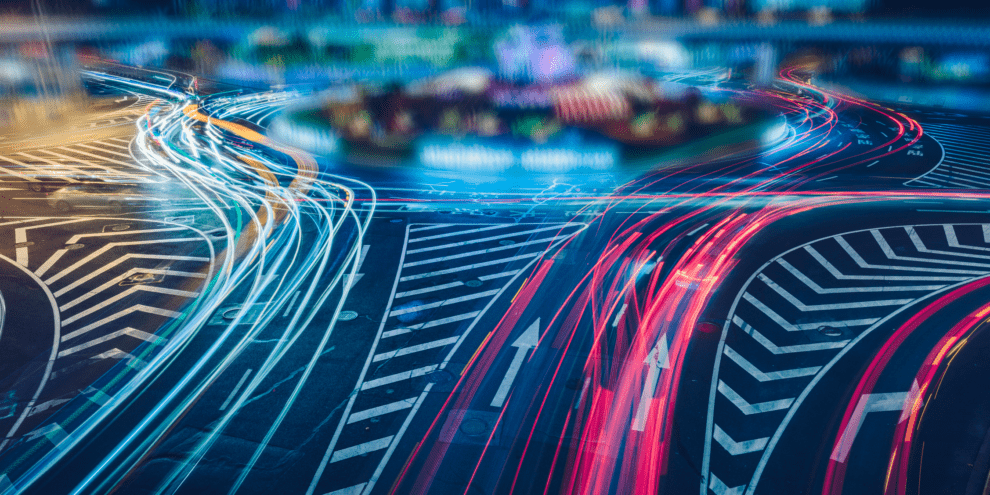
The IoT in the Niche of Transportation – Why It’s So Important

Undoubtedly, the IoT in transportation and transport logistics will soon take over the market, it is already in the process. The time has come when the hardware may as well direct you, and not vice versa. Something you could only guess in the past: delivery time, vehicle location and status are now at your fingertips from any device connected to the cloud.
Such benefits are provided by information that is constantly being updated. For instance, IoT technology enables in-depth route analysis. The company receives information about all the troubles occurring on the roads in real time due to traffic participants being connected to the IoT network.
Let’s take a look at the benefits of IoT integration in transportation and whether your company needs this technology at all.
Internet of Things Supply Chain Benefits
Transparency
This is one of the essential Internet of Things supply chain benefits achieved through IoT integration in transportation. Companies get to easily monitor the live location of their supply chain vehicles. Previously, the only way to get vehicle location data was a physical checkpoint. With IoT in transportation, you can examine how delivery is happening and whether resources such as fuel are being used properly in the delivery.
Fuel consumption tracking is just one example of how the IoT can notify about vehicle health. After IoT integration in transportation, companies can also receive data about the wear of parts, for example, an engine. This amount of data will make it possible to provide complete transparency in the supply chain. It is quite difficult to optimize the delivery process if there is simply no delivery data or if it is vague.
Data collection
Data generated and collected by the IoT in logistics helps to avoid tons of nasty situations and to keep the transport in good condition for troubleshooting even before the delivery process.
The generated data can be most efficiently used for:
- analytics
- optimization of processes
- automation of processes
The delivery process is impossible to make out without reliable, real-time updated data on it. By obtaining this data with IoT in vehicles, you can influence delivery by optimizing it in the best way. Optimization does not imply that the company will indicate the delivery route every time, the system of work itself must change, thereby reducing the risk associated with the human factor.
But the collected data is not the end of the process. The data must be filtered and systematized. Turn to Sirin Software if you need assistance in developing and maintaining software for IoT technology employment in your supply chain.
Analytics
Data analysis involves not only the study of transport behavior but also more general metrics of enterprise success. Accurate vehicle and delivery data allow you to see a bigger picture with the same level of clarity. The IoT in logistics will help you study the already familiar metrics, but with more accurate data. Moreover, automation will simplify and structure the process of calculating this data.
Flexibility
Keeping track of the location of the vehicle and the state of the path along which it delivers, you get the opportunity to influence it, which will definitely lead to a positive result. For example, the IoT in logistics allows you to automatically select the best road, taking into account traffic jams, traffic speed, and emergency situations.
The latter is especially important for the logistics of transport carrying potentially dangerous goods. In this way, traffic can be optimized in the shortest possible time, leading to faster and safer arrival. In the case of incidents, the IoT in transportation will help much more efficiently than managing the route from the memory and understanding of the driver.
Security
When we get to the point where each unit of transport becomes an element of a huge network, thanks to IoT integration in transportation, we will be able to completely secure the delivery process for both the driver and the transported cargo. It’s not even about cars without drivers (although things are leading to this), but about the awareness of drivers. The driver, fully aware of what is happening on the road, gets valuable time to avoid danger or delays. Collecting driver data also gives you insight into patterns that can lead to dangerous situations.
Automation
With all the necessary data and errors corrected, you get the opportunity to automate the supply chain – another one of the fundamental Internet of Things supply chain benefits. Machine learning and artificial intelligence can streamline the capturing and organization data. Automatic processing and systematization of data allow you to manage it more efficiently and quickly. Automation based on extensive data allows you to scale your business using IoT in vehicles without involving additional logistics specialists.
Are You Prepared for the Powers of IoT Technology?
The use of the IoT in transportation presupposes a major restructuring of the company; the purchase of sensors for parts will not be enough. You may need to consider hiring workers who already have experience with new technologies. You will also need to involve specialized software development professionals such as Sirin Software.
There is no doubt that IoT will transform the logistics industry. By 2030, its average annual growth rate in the market will be 13.2%. In 2019, the IoT in the transportation and logistics market reached $34 million.



